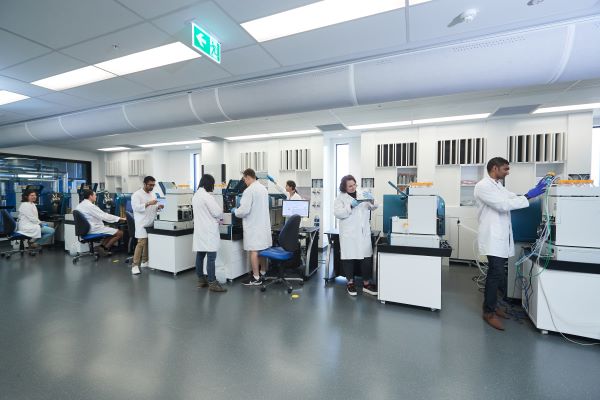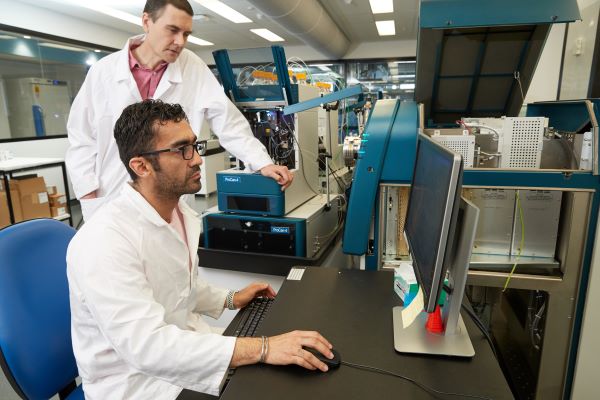ProCan’s database could save billions in healthcare costs
Billions of dollars could be saved in Australian health costs as a result of the ProCan project.
ProCan (The Australian Cancer Research Foundation International Centre for the Proteome of Human Cancer) is amassing the world’s largest single database of cancer proteomes. During the past seven years, a multidisciplinary team has processed and analysed the complex protein make-up (proteome) of more than 17,000 cancer samples obtained from more than 50 collaborating institutions around the world. By developing artificial intelligence techniques to investigate this large and growing cancer proteome database, ProCan is discovering patterns that can predict a cancer’s aggressiveness or likely response to treatment.
ProCan aims to create a future in which the clinician can choose the most effective treatment plan tailored to the individual patient’s cancer within hours of a biopsy being processed and cancer diagnosed.
Economic benefit analyses by PwC Australia show ProCan could save as much as $1.76 billion in Australia over 10 years in avoided health costs, based on three cancer types and only a single clinical scenario in each. Even if ProCan saves just 5 per cent of healthcare-related costs across all cancer types, the savings would be $393 million per year.
Although such financial benefits are highly desirable, Professor Roger Reddel, ProCan’s Co-Director and the Director of the Children’s Medical Research Institute (CMRI) in Westmead, NSW, where ProCan is based, says the priority is helping each and every cancer patient have the best available treatment plan from the start. “If you get the best treatment at the beginning, the chance of cure is increased, and treatment that would be futile for that patient is avoided,” he says. “That avoids wasting time, or suffering side effects from failed treatments.”

“The problem with cancer is that everybody’s cancer is essentially unique. ProCan is effectively Google for cancer, or ChatGPT for cancer. The database and technologies we are building will make it possible to find cancers from around the world that are the closest match to a new patient’s cancer and find what treatments succeeded for those patients and what didn’t.”
ProCan started seven years ago with just two people and a $10 million seed funding from the Australian Cancer Research Foundation. It now has 45 employees and has secured an extra $39 million in funding, with several grants from NSW Health, including one of almost $1 million for a high-performance computing cluster.
“This is a big data project,” Professor Reddel says. “Data of this type has never been generated on this scale before, so we have employed a team of software engineers to help handle these massive amounts of data.”
Professor Reddel says past research on precision cancer treatment planning focused on DNA, as genomic sequencing technology became available. “But in reality, it is cancer proteins that will determine how the cancer will behave – whether it will be aggressive or spread, or how it will react to treatment. Of all the ’omes, the proteome is likely to be the most useful and clinically relevant predictor.”
As the ProCan database continues to grow, work continues on predictive capability, which is more developed for some cancer types than others. Professor Reddel says he hopes ProCan’s predictive capability will be available to clinicians for certain cancer presentations in three to five years.
For example, in early stage lung cancer, most patients are free of cancer after the cancer is excised. But in a substantial minority of patients, the cancer returns post-surgery, leaving clinicians and patients alike wishing they had started chemotherapy or radiotherapy earlier. “The potential benefits would be very significant if you could identify at the start the cancers that will relapse, and give post-surgery chemotherapy or radiotherapy only to those patients,” Professor Reddel says.
He thanked NSW Health and Cancer Institute NSW for their ongoing, pivotal role in funding the project. “People don’t need much persuading about this. We’ve known for 50 years that by measuring levels of just one protein (oestrogen receptor) in breast cancer, you can predict with 70 per cent accuracy whether the cancer will respond to anti-oestrogens. ProCan is analysing thousands of proteins in many cancer types. There’s a lot of excitement about it.”

Updated 2 years ago